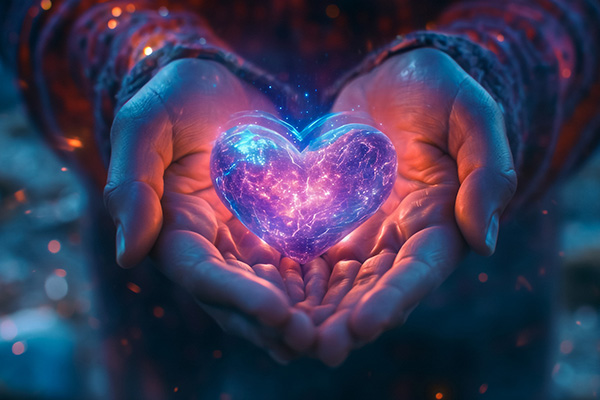Love & Relationships
True Love Has No Time Limit, And No Deadline!
 We live in a busy world where most of us have gotten used to a very hurried life. Everything is on a strict schedule and time limit, because we now judge everything this way.
We live in a busy world where most of us have gotten used to a very hurried life. Everything is on a strict schedule and time limit, because we now judge everything this way.
We have become a restless society demanding instant solutions and immediate gratification in all things.
If the line is too long at the supermarket or fast food restaurant, some of us get upset. If we have to wait for our doctor when we have an appointment, we become annoyed. Some cut in front of others, or even cross streets while the light is still red, because they hate to wait.
Similarly, if we do not get an immediate reaction from our latest love interest, some of us do not become just a little restless or anxious. No, they get really upset!
If this kind of hurried, rushed way of life plagues you, then you may definitely need an major attitude adjustment. Because your naturally loving heart and your capacity for love and romance may be in serious trouble.
Maybe your heart never got the memo that there was no need to constantly hurry up and adhere to time limits and deadlines.
What happened to dating? Romantic chats? Patiently anticipated expressions of affection? Dozens of love letters, and more recently emails and test messages? The joint holidays and weekends away? The looking forward to new adventures together?
Your Sacred Center Of Self-Love
 We all thrive on being loved. This is natural, of course, if you look back at humanity in history on an evolutionary level. Ancient people came together in tribes, families, and groups, to cultivate a place of safety, security, nurturance, and love.
We all thrive on being loved. This is natural, of course, if you look back at humanity in history on an evolutionary level. Ancient people came together in tribes, families, and groups, to cultivate a place of safety, security, nurturance, and love.
If you were different or stood out in any way, or even left the tribe, you were literally putting your own life at risk. This topic can be viewed from so many arenas, including psychological, spiritual, scientific, and psychic.
I often wonder how and when did we start defining ourselves by how others felt about us, and why did we believe that other’s thoughts about us were true? At what point in time did we allow others to define us? It’s as though we as humanity went into a deep trance.
We all know the phrase, “Love thyself first”. When did we forget this vital piece of information?
There are many ways we can come back in touch with this essential truth, but for the most part, our society does not support a lifestyle that would naturally lead us back to our sacred center of self-love.
How often do you take a moment to look in the mirror, or tell yourself, “I love you?” Most of us feel silly doing this, but it is very healing.
Have you ever met an older person who behaves in ways that are foolish or who just doesn’t give a hoot what anyone else thinks? My paternal grandfather used to throw dinner rolls across the table at me in fancy restaurants. While my parents and other family seated at the table would roll their eyes at my Grampy, I used to laugh hysterically!
Why Some Of Us Must Walk Alone To Find Our Tribe
 The topic of belonging comes up a lot lately in conversations with close friends, and it is often a concern for my clients when I do readings. A rise in loneliness appears to be a worldwide issue.
The topic of belonging comes up a lot lately in conversations with close friends, and it is often a concern for my clients when I do readings. A rise in loneliness appears to be a worldwide issue.
A conversation I had with a Spanish family recently was truly food for thought for me. We spoke about the disconnect with people in general, but the family in question strives to maintain family meetings and chats over meals, even though the younger ones spend more and more time on their phones.
One of the younger family members, told me that having a sense of community is part of his family’s religious practice. He makes a conscious effort to be disciplined about phone use when the family comes together. Hopefully, he will educate more of his peers about the importance of being present for in-person connection.
Personally, I have always tended to shy away from group gatherings, but I must say that I have been impressed by the warmth of the locals here in Spain, and their desire to include me in their community.
A few years ago, when my husband died just before Christmas, my Spanish friends in the farming community where I lived at the time told me, in no uncertain terms, that I would be joining them for Christmas and New Year’s family gatherings. I told them I’d prefer to stay home, especially considering the snow the previous Christmas that had confined us to our property for a few days.
For A Reason, A Season, Or A Lifetime?
 I’m often asked in relationship psychic readings if a certain person is ‘The One.’ Is this the person whom my client is supposed to be with in this lifetime?
I’m often asked in relationship psychic readings if a certain person is ‘The One.’ Is this the person whom my client is supposed to be with in this lifetime?
This is such a common question and one that usually deserves a more elaborate answer for clarity.
People come in and out of our life for a myriad of reasons. Some of them are only there for a short period of time, while others remain for decades, or the rest of our life.
Have you ever felt like you keep meeting the same person over and over again, but in a different body? For example, a gentleman might call in for a reading about a woman who he’s been dating for a month.
He wants to know why all of a sudden she has pulled away or is paying less attention to him, and then he goes on to say that he continues to meet this same kind of woman. They all seem very interested in him for a short time, and then all of a sudden they just disappear.
Why does this keep happening to him? This is where the inquiry tends to come up of, “Will I ever meet the right woman?”
The first thing I notice during readings, when I tune into someone’s energy, is the patterns they carry. We all have patterns running from our past, and though it may be harder to identify at times, once noticed and embraced, it actually helps us to grow spiritually. It allows us to become more aware of our authentic self, what our gifts are, and why we are here in this life.


 There are angels and spirit guides that work with us daily. They change at times, depending on what we need. They are always within reach and can hear our requests, our tears, and our laughter. They feel our sadness and joy.
There are angels and spirit guides that work with us daily. They change at times, depending on what we need. They are always within reach and can hear our requests, our tears, and our laughter. They feel our sadness and joy.